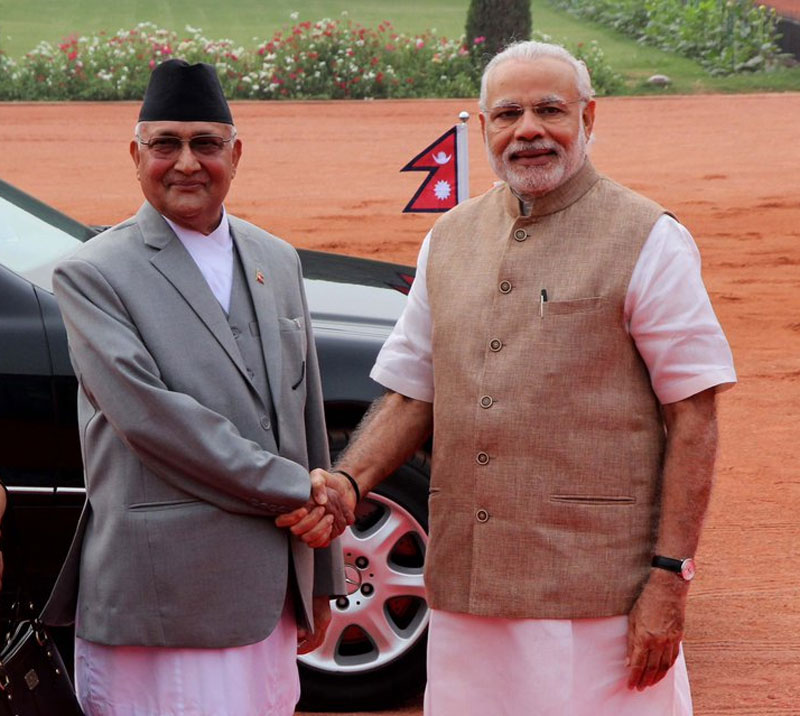By yubaraj Ghimire ( 3 April 2018) – K P Oli perhaps tried to emulate at home what Narendra Modi did at the time of his swearing in as prime minister four years ago, but he was not as successful. On Tuesday, Oli invited all the former prime ministers, like Modi invited all heads of government from the SAARC region, to join him during his “briefing” to the heads of diplomatic missions and senior diplomats based in Nepal.
But no one except Madhav Nepal and Jhalanath Khanal, both from his party, the Communist Party of Nepal-Unified Marxist Leninist (UML), joined him. Even Pushpa Kamal Dahal, chairman of the Nepal Communist Party-Maoist Centre, the coalition partner in the Oli-led government, chose not to attend. The idea behind this unprecedented approach was to display that Oli had the backing of all leaders, cutting across party lines, when he spoke to the international community.
After bringing state investigative agencies and departments under him directly, Oli appears determined to become increasingly powerful at home and abroad. He also seems to be in hurry to secure the long-pending unification of the UML and Nepal Communist Party-Maoist Centre to form the proposed Communist Party of Nepal prior to his Delhi visit scheduled from April 6. Having secured three-fourths support during the confidence vote in Parliament, the two Left parties’ unification would have projected him as a powerful leader in Delhi, which had caused enough hardship to Nepal and the government through a blockade and non-cooperation, ultimately leading to the downfall of the government that Oli headed last time.
But the latest condition set by Dahal, that his party should have an equal share in the united party’s committees at all levels, has put a spanner in the works. Absent a merger of the two parties, the present parliament will continue to be a “hung” one, and the Oli government vulnerable to shifting political equations and the resultant instability that Nepal has been victim to over decades.
“We will not accept unity without equal share in the committees,” Dahal told a training programme of his party’s youths last week. The UML, especially Oli, has told Maoist leaders to accept a pragmatic share based on their parliamentary strength: 30 per cent for the Maoists, and 70 per cent for UML. Simmering differences between the Maoists and the UML that may affect their “alliance” are coming to the fore a bit too early.
During his briefing to the diplomats, Oli stated categorically that there would be no general amnesty granted in the cases of gross human rights violations and crimes against humanity that took place during the insurgency spearheaded by the Maoists between 1996-2006. The UML has within it a strong pro-human rights lobby working in collaboration with international and UN agencies, but this also increases the vulnerability of the Maoists.
Oli was, perhaps, not happy or fully prepared when Delhi announced the dates of his visit — April 6 to 8 — unilaterally through a group of Nepali journalists that the MEA had hosted. While there is a growing feeling within the ruling party that Oli should do some plain speaking to Delhi from a position of strength, the visit in less than two months of his assuming office, does not give him enough time to fully prepare himself. Yet, the Delhi visit is being seen as an opportunity.
“We have a very close relationship with India that has at times seen ups and downs but the lessons we can draw from each setback is that we must continue to have that intimacy,” newly-appointed Foreign Minister Pradip Gyawali said recently. Delhi is as keen to stop Oli from moving into China’s embrace. While he has said categorically that Nepal would want to maintain policy of “equal distance” between India and China, a European Union poll observer team has caused an unanticipated problem. The team recently demanded that the government remove the Khas-Arya, a hill-group, from the list of beneficiaries of “proportional representation” in federal and provincial legislatures. The EU observation is exposing early signs of ethnic polarisation in Nepali society, with some groups funded by the EU supporting the recommendation.However, for China, Oli’s equal distance theory is a victory. “We commend the Nepali government’s commitment towards independent foreign policy. We also support Nepal developing friendly and positive relations with its neighbours,” Foreign Ministry spokesperson Lu Kang said in Beijing, adding that “China, Nepal and India are important neighbours to each other. We hope these three could work together, have some sound interactions and achieve common development.” China, naturally, expects Oli not to back off from Nepal’s commitment to be part of the Belt and Road initiative, and allow China a greater involvement in Nepal’s development sector.
To achieve all this, Oli needs smooth sailing at home and a quick unification of the Left parties. But the snags appearing early on on that front do not quite augur well for the prime minister.
[email protected]. This article first appeared in The Indian Express.


